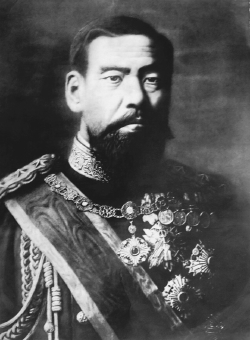Last week we asked the Japanese army a somewhat sarcastic question: What were you guys thinking?
I’d argue that the Japanese decisions of 1931, 1937, and 1941 make almost no sense unless we delve back a bit into Japanese history. We need to go all the way back to the mid-19th century, to 1853 in fact.
That year, the Japanese had what we might call a rude awakening. Perched on their remote home islands, they had managed to avoid contact with foreigners for centuries, and they liked it that way. Back in the 1500s, they’d had a bellyful of the outside world, especially the competing imperialisms of Portugal, the Dutch, and the British. Adopting western technology, especially firearms, they had managed to drive out the westerners—their missionaries and soldiers alike—and had then closed the doors on the outside world.
The western powers changed all that in 1853. More specifically, the U.S. Navy did, with a squadron of what the Japanese called “black ships” under Commodore Matthew Perry. Amazingly, these vessels moved without sails! They belched fire from long tubes! They could blow up anything that got in their way! It was an existential crisis for Japan, which suddenly saw itself at the mercy of forces it only dimly understood. It is about as close as any country on earth has ever come to having aliens show up bearing ray guns. I’m thinking here, perhaps, of that old Twilight Zone episode “To Serve Man,” where the victims wind up as meat on the table of the conquerors.
Or perhaps a better analogy: being tossed into the ocean and having to learn to swim, stat. It was a dangerous world, an imperialist dog-eat-dog era many times more voracious than that of the 1500s. The Japanese could see what had happened to India, and what was happening to China. They could see what happened to backward states that tried to stand up to the western powers.
 Perhaps the most amazing thing was that they managed to do just that. They modernized overnight. They overthrew the feudal system of the Shogun (the bakufu) and created a unified central government in the newly renamed city of Tokyo around the figure of the Emperor Meiji (left). They built railroads and industries. They formed an army of peasant draftees armed with modern 19th century weapons. No other country on earth has ever taken such a crash course in modernity.
Perhaps the most amazing thing was that they managed to do just that. They modernized overnight. They overthrew the feudal system of the Shogun (the bakufu) and created a unified central government in the newly renamed city of Tokyo around the figure of the Emperor Meiji (left). They built railroads and industries. They formed an army of peasant draftees armed with modern 19th century weapons. No other country on earth has ever taken such a crash course in modernity.
Not everyone was pleased, of course. Change is always unsettling, and the new central government had to fight civil wars against the disgruntled old guard. But the reformers won and created a new Japan. They even began playing the imperialist game themselves, beating gigantic China in the Sino-Japanese War of 1894-95 and, even more improbably, battering the Russian army in Manchuria in the war of 1904-05.
Still, the existential crisis didn’t suddenly vanish. It was clear that the Japanese could never outproduce the western nations, and their technology, at least in its earliest phases, was entirely derivative and reliant upon the west. They had to hire military advisers for the army (from France at first, and then from Germany). They had to hire naval advisers from Britain, and the first ships of their new navy were produced abroad. Moreover, the civil wars showed that while the new peasants conscripts were able to smash the Samurai through superior resources, they could never match those old Samurai in fighting spirit and élan.
In other words, it was still a very dangerous world. And here, I think is the crucial point. In an era of brute force, of steel mills and armaments plants, where the big fish ate the little one, Japan could never really compete. Indeed, even surviving was a long shot. Its military leaders had to find a different path to prepare the nation for the struggles they believed lay ahead. If Japan could not contend in the realm of material factors, then it would have to emphasize the spiritual ones: its unique heritage, its unbroken imperial line stretching back over 1,000 years; its cultural and moral superiority to neighboring peoples. It had gotten rid of the Samurai in the civil wars, but now it needed to resurrect something like the Samurai spirit and impose it on a new mass army of conscripts. It had to turn those ordinary soldiers into “human bullets” willing, even eager, to die in the service of the emperor. In this way it might be able to compensate for material weakness.
And so bushido was born: the “way of the warrior” (or perhaps, the “way of the knight”).
More next time.
For the latest in military history from World War II‘s sister publications visit HistoryNet.com.




